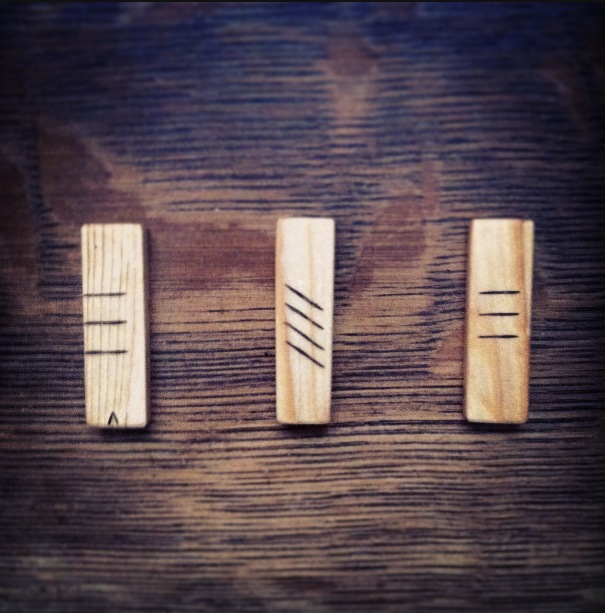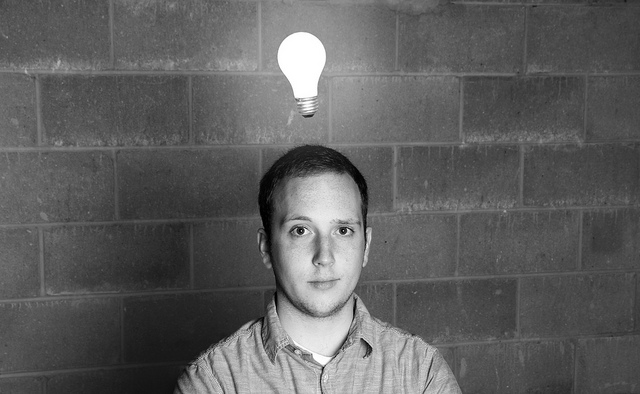I pulled three ogham out of the leather pouch and laid them, one by one, onto the surface of my shrine. This divination would be the omen for all of the Solitary Druid Fellowship, a broad swatch of Pagandom that joined one another in a shared practice for the first time on the Winter Solstice. These three ogham would be the message for the whole lot.

The ogham is a system of divination that still challenges me. I continue to rely on ogham experts to tell me what these little piece of wood mean. I don’t know them all by heart, either.
I’ll wait until the ritual is done to see what they mean, I thought. This felt like the right choice at the time, and I continued on with my personal observance of the High Day.
When the ritual was done, I sat at my desk. I opened my copy of The Solitary Druid to the page with the ogham chart. I got out the journal I use for my divination practice, and turned to a blank page.
There were three pre-written questions used in the SDF liturgy, and I copied them into the journal:
- How were my offerings received?
- How shall the Kindred respond?
- What more would you have me learn?
I found the ogham meanings on the chart, and copied them down as well.
- Fern (Alder): Guidance
- Straif (Blackthorn): Trouble and Negativity
- Ur (Heather): Healing & Homelands
Oh, no.
Trouble and negativity? Really? Trouble and negativity?
I stood up from my desk. I looked at my shrine and the still-burning candles.
Perhaps I should do the ritual again, make more offerings, see if there’s a different omen.
But no, that wouldn’t make sense. The omen is for all of the group. What would one person’s extra offerings do to change the omen. And anyway, do I really believe that a few extra oats can change the minds of the gods? For that matter, do I believe their minds work like that? Do I think that the Kindred are that offering-hungry, or offering-dependent, or offering-influenced? Is that really how it works?
And why am I being so one-dimensional about “trouble and negativity?!”
All of these thoughts are racing in my head as I pace in front of my altar.
Then it hits me.
This isn’t my omen to read.
These ogham were drawn for the entire group, and it’s up to the group to interpret it.
So yesterday, after all of the Fellowship had a change to observe the Solstice and share about their experiences on the SDF blog, I put up a new post. Imbedded within it was a Google Doc, and the solitaries of the Fellowship were all invited to help crowdsource the SDF omen.
The results have been pretty amazing. People who have no real connection to the ogham, or who don’t even see themselves as being skilled with divination, are offering their interpretations. And thanks to the cool tech that Google provides, some of this collaboration has been happening between multiple contributors in real time.
It’s super cool.
All of this has got me thinking about divination, though. When I read the tarot, a practice that is much more comfortable to me, I rarely (if ever) look at anyone else’s concordance of card meanings. I go with my gut, trusting my knowledge of the traditional meanings while holding that up against my impressions. It feels like a very natural, very organic way of reading.
I’m also not normally reading the cards as “the message of the Kinded,” or something like that. It’s my impression, my intuitive take. Sometimes the reading feels inspired, and the messages that come feel as thought they are not completely my own. But I never think of myself as a mouthpiece for the gods.
That would be kind of Pope-ish, wouldn’t it?
And yet, I approached the draw of the ogham with this sense of obligation to communicate the message of the Kindred to the Fellowship. That implies that there is one message, or that there is one correct answer, and I don’t believe that.
I wonder…
What if the questions we ask during a divinatory practice are simply designed to point our focus toward the divine, but the answers we receive have nothing to do with the questions? If we work from the idea that the Kindred, the divine in its multiplicity, are communicating with us, isn’t it possible – likely, even – that the messages we receive are designed to re-direct our focus away from the questions, away even from our preconceptions of the divine, toward….what? Ourselves? Each other? The world? Some holy task of being human?
What do you think divination really does? How would you describe its function and purpose? Is it a part of your practice? And if so, what do you think is going on during your divination? If it isn’t a part of your practice, why not?
Tell me —
How does divination work?

Leave a Reply